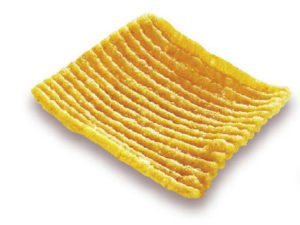On the 21 March 2018 the Danish Board of Appeal (“The Board”) delivered its decision regarding the trademark protection of the shape of the following potato snack (decision no. AN 2017 00006):
The snack originates from the famous snack brand Kims which is owned by Orkla Confectionary & Snack Danmark A/S (“Orkla”). In the decision The Board concluded that the most significant feature of the shape of the product was the grooved surface, which could merely be considered as a feature which was necessary to obtain a technical result and/or followed from the nature of the goods themselves. Therefore the shape of the snack in question fell within article 2(2) of the Danish Trademark Act (which corresponds to article 3(1)(e) in the Trademark Directive (Directive (EU) 2008/95) (“The Directive”) which states that signs shall not be registered if they consist exclusively of:
- the shape which results from the nature of the goods themselves
- the shape of goods which is necessary to obtain a technical result
- the shape which gives substantial value to the goods
Originally Orkla applied for the 3D trademark in 2014. At that time the Danish Patent and Trademark Office assessed that the mark was without inherent distinctiveness, but that the mark had acquired distinctiveness through an extensive use on the Danish market. Consequently the mark was registered in 2015 for potato-based chips on the basis of acquired distinctiveness. Following the registration the snack company Estrella Denmark A/S filed an opposition together with a number of their sub-suppliers. The opposition was based on several grounds among others that the sign was excluded from registration with reference to article 2(2) of the Danish Trademark Act (which corresponds to article 3(1)(e) in The Directive).
The opposition Division upheld the opposition and concluded that the mark fell within article 2(2) of the Danish Trademark Act and was therefore excluded from registration with no possibility to prove acquired distinctiveness. This decision was confirmed by The Board.
According to the decision the grooved surface of the potato snack merely performs a technical function in relation to the texture and crispness of the snack since the grooves affect the way the snack reacts when it is fried resulting in a more crisp snack. This conclusion was supported by several patents which described similar functions (although not related to the actual snack product in question). Furthermore flavour-giving substances will easily be embedded in the grooves which add extra flavour to the snack. A similar description of the function of the grooves had actually been used by Orkla in the marketing of the potato snack in question.
Consequently the mark was excluded from registration according to the second sentence of article 2(2) of the Danish Trademark Act (the technical function).
Given that The Board found that the grooved surface of the snack contributes to the crispness and extra flavour of the snack, this was also considered to be a characteristic which has a substantial effect on the function of the product concerned and which the consumers are likely to seek in the products of competitors. According to the TRIPP TRAPP decision from the European Court of Justice C-205/13, paragraph 27, such characteristics which are inherent to the generic function of the product and which consumers may be looking for in the products of competitors, are also covered by the first indent of article 3(1)(e) in The Directive (which correspondence to first sentence of article 2(2) of the Danish Trademark Act). An exclusive right to the grooved surface would therefore make it difficult for competing undertakings to give the products a shape which was equally suitable for use, which would result in an unfavourable effect on the structure of competition on the market concerned.
Accordingly the mark was also excluded from registration according to the first sentence of article 2(2) of the Danish Trademark Act (the nature of the good).
In 2006 the Danish Commercial Court (“The Court”) made another decision regarding the shape of snack products (decision no V-116-04). In this case The Court found that the cone-shaped BUGLES snack, namely ![]() , which had and enhanced distinctive character acquired trough use, could prevent another cone-shaped snack, namely
, which had and enhanced distinctive character acquired trough use, could prevent another cone-shaped snack, namely  , from being marketed in Denmark. The Court found that the shapes of the snacks were clearly confusingly similar – the question of article 2(2) of the Danish Trademark Act was not considered by the Court in this regard.
, from being marketed in Denmark. The Court found that the shapes of the snacks were clearly confusingly similar – the question of article 2(2) of the Danish Trademark Act was not considered by the Court in this regard.
_____________________________
To make sure you do not miss out on regular updates from the Kluwer Trademark Blog, please subscribe here.
Kluwer IP Law
The 2022 Future Ready Lawyer survey showed that 79% of lawyers think that the importance of legal technology will increase for next year. With Kluwer IP Law you can navigate the increasingly global practice of IP law with specialized, local and cross-border information and tools from every preferred location. Are you, as an IP professional, ready for the future?
Learn how Kluwer IP Law can support you.



